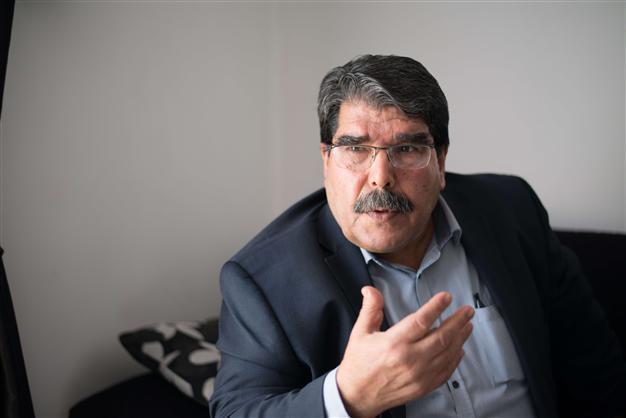Kurds seek autonomy in a federal Syria: top official
MARSEILLE

Salih Muslim, co-president of the Syrian Kurdish Democratic Union Party (PYD), speaks during an interview in Marseille, southern France, on December 1, 2013. AFP Photo
Syria’s Democratic Union Party (PYD) hopes to create an autonomous Kurdish region in a federal Syria, PYD leader Saleh Muslim has told Agence France-Presse in an interview.Speaking during a visit to France, Muslim confirmed that a commission was in the process of preparing a Constitution for the northeastern and northwestern regions of Syria that are majority Kurdish.
“The [Syrian] Kurdistan region will be divided into three autonomous provinces: Kobani [center], Afrin [west] and Qamishli [east],” he said, speaking through a Kurdish-French translator. “The goal is not to secede, but the Kurds want a federal system in Syria.”
Syria’s Kurds make up around 15 percent of the population and are mostly concentrated in the northeast and northwest of the country, along the Turkish and Iraqi borders. They have walked a careful line during Syria’s uprising, declining to actively join either the government or the rebels, and instead focusing on building autonomy in Kurdish-majority regions.
The Syrian government withdrew troops from those regions in mid-2012 and focused its energies elsewhere. The armed wing of the PYD, the People’s Defense Units (YPG), took over security in the areas, and has kept armed rebels out as part of a tacit deal to ensure that regime troops will also stay out. On Nov. 12, the PYD and other Kurdish parties announced the establishment of an autonomous transitional administration. Turkish Foreign Minister Ahmet Davutoğlu has harshly criticized the self-rule declaration and accused the PYD of not “keeping its promise.
“It’s not the creation of an autonomous government. However, 19 representatives were chosen in July to prepare a Constitution and an electoral law and to define the mechanisms by which the region will be led,” Muslim said. “This commission has finished its work, and a date will soon be set for elections.”
The move to consolidate its autonomy on the ground comes as the PYD battles jihadist fighters that have sought to control Kurdish areas. The Kurdish region to Syria’s east includes oilfields, and runs along the border with Iraq, providing jihadists with a key route for fighters and supplies.
Muslim said Kurdish forces were facing off against jihadists “supported and sent by the Turkish government,” adding that the fight was continuing. “We have been helped by our people, the Iraqi Kurds, the Iraqi president (Jalal Talabani, a Kurd) and by the PKK,” Muslim said.
The outlawed Kurdistan Workers Party (PKK) is designated a terrorist organization by Turkey, the United States and the European Union. Muslim’s PYD is considered to be close to the group, though it has denied being the PKK’s Syrian branch. Muslim briefly visited Turkey twice in July and August, when he reportedly discussed with Turkish officials the PYD’s plans to form an autonomous administration, which had triggered concerns in Ankara.
Muslim insisted that Syria’s Kurdish regions, which are also home to Arab Syrians, would welcome everyone.
“There are three sorts of Arabs among us: there are those with whom we have always lived and who we have fought alongside. We defend the brotherhood between these peoples. There are those who do not belong, Arabs who came from outside, other countries or the region, the jihadists who have burned our homes, and decapitated Kurds. Finally, there are the Arabs who were moved to Kurdistan by force by [former Syrian President] Hafez al-Assad ... to Arabize the region,” he said.
“They are victims ... and we advocate a peaceful solution for these populations. Those who can return to their hometowns should do so and the others can live in peace with the Kurds,” Muslim added.
















